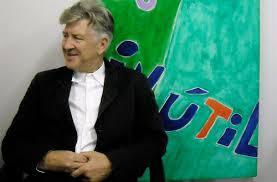 LYNCH MEETS THE PUBLIC IN TRANSCENDING LYNCHDavid Lynch in Brazil, talking about TM and dropping hints
LYNCH MEETS THE PUBLIC IN TRANSCENDING LYNCHDavid Lynch in Brazil, talking about TM and dropping hintsDavid Lynch, the great American filmmaker, is a distinctive-looking man with a bland, pasty face, pale blue eyes, and an impressive mound of sleek, wavy hair. He wears well cut-suits with good white shirts, often buttoned up without a tie. He smokes and drinks many cups of espresso. When he speaks, the American twang of his voice surprises. For 35 years, since he made his first film,
Eraserhead, he has practiced Maharishi Mahesh Yogi's "transcendental meditation" (TM) twice a day. He rarely speaks of his work as a filmmaker without mentioning this, and saying that it has enabled him to deal with the dark side of his consciousness, as well as with the nervousness and fear he once felt. (Obviously the stylish and original way his films explore that dark side is the chief source of their fascination.) Recently Lynch went on book tour with the singer Donovan to talk about his
Catching the Big Fish: Meditation, Consciousness and Creativity and promote an interest in transcendental meditation. Marcos Andrade is a native of Rio de Janeiro who studied filmmaking in New York. His first film was the 2004
Korda, a wordless story of a solitary man. Practicing TM himself for a few years, Andrade became involved with the David Lynch Foundation through his meditation teacher. Andrade made this, his first documentary film, by following the Brazilian leg of Lynch's TM book tour.
It's not a sure thing that this film will convert you to TM, or even tell you much about it. This is best seen as a film about David Lynch, one with not much substance in itself, but of value to anyone who truly admires the man's work, who perhaps has met the man before, or just heard him in a Q&A, caught a appealing whiff of his aura, and wanted to catch more. In numerous chats and public appearances during the film, Lynch tends to dodge the inevitable requests for, say, the meaning of the blue box in
Mulholland Drive, or a list of his favorite contemporary filmmakers, but the aura is there, and sometimes though smilingly refusing to explain anything he draws a nice picture of the genesis of a film -- a song, say, red lips, green grass at night, an ear found in a wood, a mystery "somewhere" (
Blue Velvet) These little asides have more value than the more airy declarations about TM and what it can do for you.
Similar comments about the book's limitations can be found on Amazon.
Publisher's Weekly bluntly says "Lynch's rants lack cohesion and substance." Lynch paints and draws, he dabbles in music, he writes, and who knows what else, while he's waiting for the idea for his next film to come to him. No need to pretend these other things matter the way
Blue Velvet or
Mulholland Drive or
Inland Empire do. But there is always something about the man, that, if you
transcend yourself and attend to it, gives watching and listening to him an almost ineffable value so long as you've ever been touched by the magic of his films.
Andrade sometimes indulges himself in little riffs of his own, like wordless passages of Lynch and his tour organizer talking, without sound, as "Blue Velvet" plays and we gaze through a blue filter; or shots, deliberately allowed to run on too long, of a crowd wandering round at a reception; a walk through an airport run backwards. We can be patient with those, and this is a film about patience. Lynch is also a model of how to respond helpfully and with good humor to endless annoying questions. Some of them are obvious, like the answer to "What is your favorite among your own films?" --
they're like children, and I love them all equally -- but Lynch replies with unusual enthusiasm and panache. He's a good intuitive teacher. He even compares transcendental meditation to the good times he spent in Los Angeles at Bob's Big Boy Diner drinking coffee and chocolate milkshakes. It provides a safe place from which you can contemplate the darkest ideas. And "a good story," he casually remarks, requires conflict, pain, dark moments.
Brazil plainly loves Lynch,and how could he not keep his good humor receiving constant adulation? But this film may have done more good for him than it does for us. Still, it has its moments, for the Lynch fan, of which I am one. He drops a few useful hints about how David Lynch films come into existence.
Seen at the San Francisco International Film Festival 2010.





